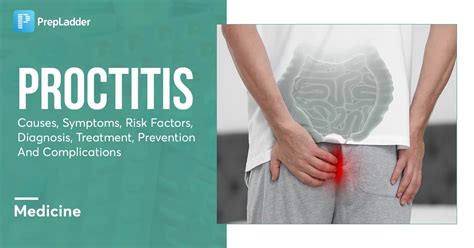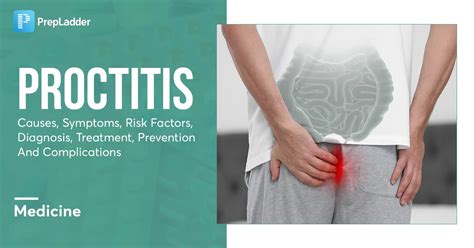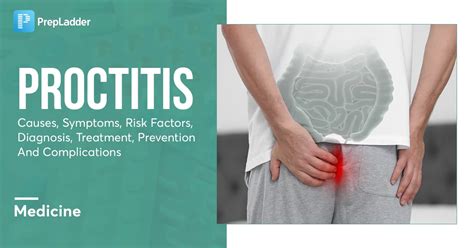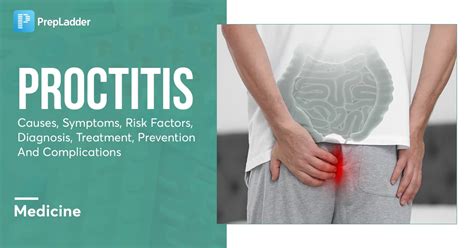Intro
Learn about proctitis, a rectal inflammation condition causing pain, bleeding, and discharge. Understand its types, symptoms, and treatments, including proctitis diagnosis and management options for anal and rectal health.
Proctitis is a condition characterized by inflammation of the rectum, which is the last part of the large intestine. This inflammation can cause a range of symptoms, including pain, discomfort, and difficulty with bowel movements. Proctitis can be acute or chronic, and its severity can vary from mild to severe. Understanding the causes, symptoms, and treatment options for proctitis is essential for managing the condition and improving quality of life.
The rectum plays a crucial role in the digestive system, serving as a storage area for stool before it is eliminated from the body. When the rectum becomes inflamed, it can lead to a range of complications, including pain, bleeding, and difficulty with bowel movements. Proctitis can be caused by a variety of factors, including infections, allergies, and underlying medical conditions. In some cases, the exact cause of proctitis may not be known, making diagnosis and treatment more challenging.
Proctitis is a relatively common condition, and its prevalence can vary depending on the population being studied. According to some estimates, proctitis affects up to 25% of people with inflammatory bowel disease (IBD), which includes conditions such as Crohn's disease and ulcerative colitis. Proctitis can also occur in people without IBD, and its causes and symptoms can vary widely. As research continues to uncover the underlying mechanisms of proctitis, new treatment options and management strategies are being developed to help people with the condition.
Causes of Proctitis

Proctitis can be caused by a variety of factors, including infections, allergies, and underlying medical conditions. Some of the most common causes of proctitis include:
- Infections: Bacterial, viral, and parasitic infections can all cause proctitis. These infections can be spread through contaminated food or water, or through sexual contact.
- Inflammatory bowel disease (IBD): Conditions such as Crohn's disease and ulcerative colitis can cause proctitis.
- Allergies: Food allergies or sensitivities can cause inflammation in the rectum, leading to proctitis.
- Radiation therapy: Radiation therapy to the pelvic area can cause proctitis.
- Trauma: Trauma to the rectum, such as from a foreign object or a medical procedure, can cause proctitis.
Symptoms of Proctitis
The symptoms of proctitis can vary depending on the underlying cause and severity of the condition. Some common symptoms of proctitis include: * Pain or discomfort in the rectum * Bleeding or discharge from the rectum * Difficulty with bowel movements * Urgency or frequency of bowel movements * Abdominal pain or cramping * Fever or chillsDiagnosis of Proctitis

Diagnosing proctitis typically involves a combination of physical examination, medical history, and diagnostic tests. Some common diagnostic tests for proctitis include:
- Endoscopy: A flexible tube with a camera is inserted into the rectum to visualize the inside of the rectum and take tissue samples.
- Biopsy: A tissue sample is taken from the rectum and examined for signs of inflammation or infection.
- Imaging tests: X-rays, CT scans, or MRI scans may be used to visualize the rectum and surrounding tissues.
- Stool tests: Stool samples may be tested for signs of infection or inflammation.
Treatment Options for Proctitis
Treatment for proctitis depends on the underlying cause and severity of the condition. Some common treatment options for proctitis include: * Medications: Anti-inflammatory medications, antibiotics, or antiviral medications may be prescribed to reduce inflammation and treat underlying infections. * Lifestyle changes: Dietary changes, stress management, and bowel habits may be recommended to help manage symptoms. * Surgery: In some cases, surgery may be necessary to remove damaged tissue or repair any damage to the rectum.Complications of Proctitis

If left untreated, proctitis can lead to a range of complications, including:
- Chronic pain or discomfort
- Bleeding or discharge from the rectum
- Difficulty with bowel movements
- Increased risk of infection or abscess
- Narrowing of the rectum (stricture)
- Cancer of the rectum
Prevention of Proctitis
While not all cases of proctitis can be prevented, there are steps that can be taken to reduce the risk of developing the condition. Some preventive measures include: * Practicing good hygiene and safe sex * Avoiding foods that can irritate the rectum * Managing stress and anxiety * Getting regular check-ups with a healthcare providerLiving with Proctitis

Living with proctitis can be challenging, but there are steps that can be taken to manage symptoms and improve quality of life. Some tips for living with proctitis include:
- Keeping a food diary to track any foods that may trigger symptoms
- Practicing relaxation techniques, such as deep breathing or meditation
- Getting regular exercise to help manage stress and anxiety
- Joining a support group to connect with others who have the condition
Coping with Proctitis
Coping with proctitis can be emotional and challenging, but there are resources available to help. Some coping strategies include: * Talking to a therapist or counselor about feelings and concerns * Connecting with others who have the condition through online forums or support groups * Practicing self-care and prioritizing physical and emotional well-being * Focusing on the positive aspects of life and finding ways to manage stress and anxietyWhat is the main cause of proctitis?
+The main cause of proctitis can vary depending on the individual, but common causes include infections, inflammatory bowel disease, and allergies.
How is proctitis diagnosed?
+Proctitis is typically diagnosed through a combination of physical examination, medical history, and diagnostic tests, such as endoscopy, biopsy, and imaging tests.
What are the treatment options for proctitis?
+Treatment options for proctitis depend on the underlying cause and severity of the condition, but may include medications, lifestyle changes, and surgery.
In conclusion, proctitis is a complex condition that can have a significant impact on quality of life. By understanding the causes, symptoms, and treatment options for proctitis, individuals can take steps to manage their symptoms and improve their overall well-being. If you or someone you know is experiencing symptoms of proctitis, it's essential to seek medical attention to receive a proper diagnosis and treatment plan. Additionally, there are many resources available to help individuals cope with proctitis, including support groups, online forums, and counseling services. By working together, we can raise awareness about proctitis and help individuals living with the condition to manage their symptoms and improve their quality of life. We invite you to share your thoughts, experiences, and questions about proctitis in the comments below, and to share this article with others who may be interested in learning more about this important topic.
